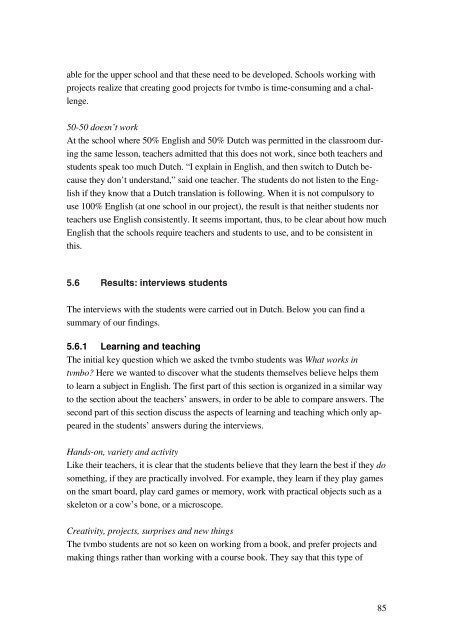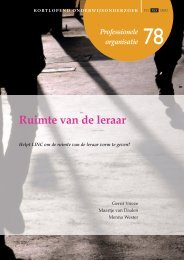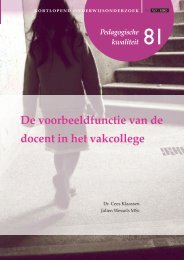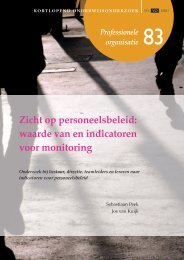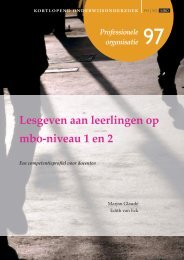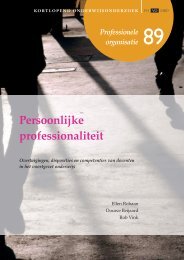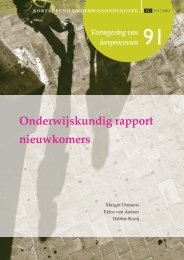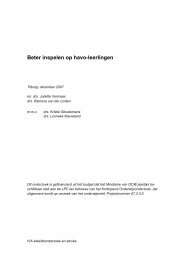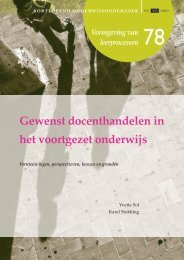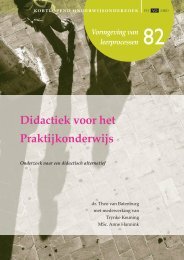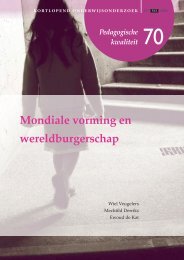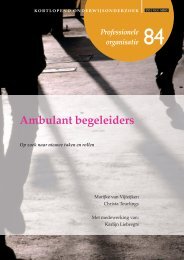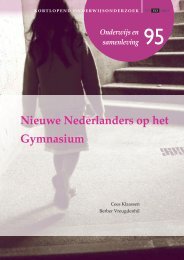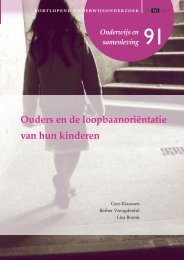Proud to be tvmbo - Kortlopend Onderwijsonderzoek
Proud to be tvmbo - Kortlopend Onderwijsonderzoek
Proud to be tvmbo - Kortlopend Onderwijsonderzoek
You also want an ePaper? Increase the reach of your titles
YUMPU automatically turns print PDFs into web optimized ePapers that Google loves.
able for the upper school and that these need <strong>to</strong> <strong>be</strong> developed. Schools working with<br />
projects realize that creating good projects for <strong>tvmbo</strong> is time-consuming and a challenge.<br />
50-50 doesn’t work<br />
At the school where 50% English and 50% Dutch was permitted in the classroom during<br />
the same lesson, teachers admitted that this does not work, since both teachers and<br />
students speak <strong>to</strong>o much Dutch. “I explain in English, and then switch <strong>to</strong> Dutch <strong>be</strong>cause<br />
they don’t understand,” said one teacher. The students do not listen <strong>to</strong> the English<br />
if they know that a Dutch translation is following. When it is not compulsory <strong>to</strong><br />
use 100% English (at one school in our project), the result is that neither students nor<br />
teachers use English consistently. It seems important, thus, <strong>to</strong> <strong>be</strong> clear about how much<br />
English that the schools require teachers and students <strong>to</strong> use, and <strong>to</strong> <strong>be</strong> consistent in<br />
this.<br />
5.6 Results: Results : interviews students<br />
The interviews with the students were carried out in Dutch. Below you can find a<br />
summary of our findings.<br />
5.6.1 Learning and teaching<br />
The initial key question which we asked the <strong>tvmbo</strong> students was What works in<br />
<strong>tvmbo</strong>? Here we wanted <strong>to</strong> discover what the students themselves <strong>be</strong>lieve helps them<br />
<strong>to</strong> learn a subject in English. The first part of this section is organized in a similar way<br />
<strong>to</strong> the section about the teachers’ answers, in order <strong>to</strong> <strong>be</strong> able <strong>to</strong> compare answers. The<br />
second part of this section discuss the aspects of learning and teaching which only appeared<br />
in the students’ answers during the interviews.<br />
Hands-on, variety and activity<br />
Like their teachers, it is clear that the students <strong>be</strong>lieve that they learn the <strong>be</strong>st if they do<br />
something, if they are practically involved. For example, they learn if they play games<br />
on the smart board, play card games or memory, work with practical objects such as a<br />
skele<strong>to</strong>n or a cow’s bone, or a microscope.<br />
Creativity, projects, surprises and new things<br />
The <strong>tvmbo</strong> students are not so keen on working from a book, and prefer projects and<br />
making things rather than working with a course book. They say that this type of<br />
85


